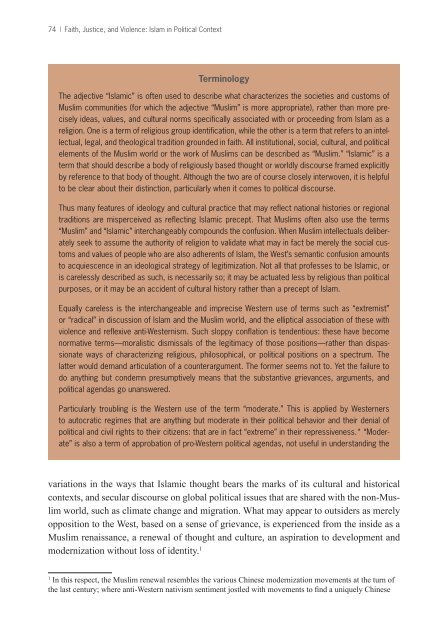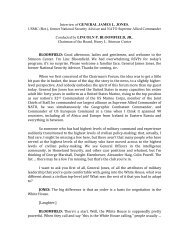Islam and Politics - The Stimson Center
Islam and Politics - The Stimson Center
Islam and Politics - The Stimson Center
Create successful ePaper yourself
Turn your PDF publications into a flip-book with our unique Google optimized e-Paper software.
74 | Faith, Justice, <strong>and</strong> Violence: <strong>Islam</strong> in Political Context<br />
Terminology<br />
<strong>The</strong> adjective “<strong>Islam</strong>ic” is often used to describe what characterizes the societies <strong>and</strong> customs of<br />
Muslim communities (for which the adjective “Muslim” is more appropriate), rather than more precisely<br />
ideas, values, <strong>and</strong> cultural norms specifically associated with or proceeding from <strong>Islam</strong> as a<br />
religion. One is a term of religious group identification, while the other is a term that refers to an intellectual,<br />
legal, <strong>and</strong> theological tradition grounded in faith. All institutional, social, cultural, <strong>and</strong> political<br />
elements of the Muslim world or the work of Muslims can be described as “Muslim.” “<strong>Islam</strong>ic” is a<br />
term that should describe a body of religiously based thought or worldly discourse framed explicitly<br />
by reference to that body of thought. Although the two are of course closely interwoven, it is helpful<br />
to be clear about their distinction, particularly when it comes to political discourse.<br />
Thus many features of ideology <strong>and</strong> cultural practice that may reflect national histories or regional<br />
traditions are misperceived as reflecting <strong>Islam</strong>ic precept. That Muslims often also use the terms<br />
“Muslim” <strong>and</strong> “<strong>Islam</strong>ic” interchangeably compounds the confusion. When Muslim intellectuals deliberately<br />
seek to assume the authority of religion to validate what may in fact be merely the social customs<br />
<strong>and</strong> values of people who are also adherents of <strong>Islam</strong>, the West’s semantic confusion amounts<br />
to acquiescence in an ideological strategy of legitimization. Not all that professes to be <strong>Islam</strong>ic, or<br />
is carelessly described as such, is necessarily so; it may be actuated less by religious than political<br />
purposes, or it may be an accident of cultural history rather than a precept of <strong>Islam</strong>.<br />
Equally careless is the interchangeable <strong>and</strong> imprecise Western use of terms such as “extremist”<br />
or “radical” in discussion of <strong>Islam</strong> <strong>and</strong> the Muslim world, <strong>and</strong> the elliptical association of these with<br />
violence <strong>and</strong> reflexive anti-Westernism. Such sloppy conflation is tendentious: these have become<br />
normative terms—moralistic dismissals of the legitimacy of those positions—rather than dispassionate<br />
ways of characterizing religious, philosophical, or political positions on a spectrum. <strong>The</strong><br />
latter would dem<strong>and</strong> articulation of a counterargument. <strong>The</strong> former seems not to. Yet the failure to<br />
do anything but condemn presumptively means that the substantive grievances, arguments, <strong>and</strong><br />
political agendas go unanswered.<br />
Particularly troubling is the Western use of the term “moderate.” This is applied by Westerners<br />
to autocratic regimes that are anything but moderate in their political behavior <strong>and</strong> their denial of<br />
political <strong>and</strong> civil rights to their citizens: that are in fact “extreme” in their repressiveness.* “Moderate”<br />
is also a term of approbation of pro-Western political agendas, not useful in underst<strong>and</strong>ing the<br />
variations in the ways that <strong>Islam</strong>ic thought bears the marks of its cultural <strong>and</strong> historical<br />
contexts, <strong>and</strong> secular discourse on global political issues that are shared with the non-Muslim<br />
world, such as climate change <strong>and</strong> migration. What may appear to outsiders as merely<br />
opposition to the West, based on a sense of grievance, is experienced from the inside as a<br />
Muslim renaissance, a renewal of thought <strong>and</strong> culture, an aspiration to development <strong>and</strong><br />
modernization without loss of identity. 1<br />
1<br />
In this respect, the Muslim renewal resembles the various Chinese modernization movements at the turn of<br />
the last century; where anti-Western nativism sentiment jostled with movements to find a uniquely Chinese

















